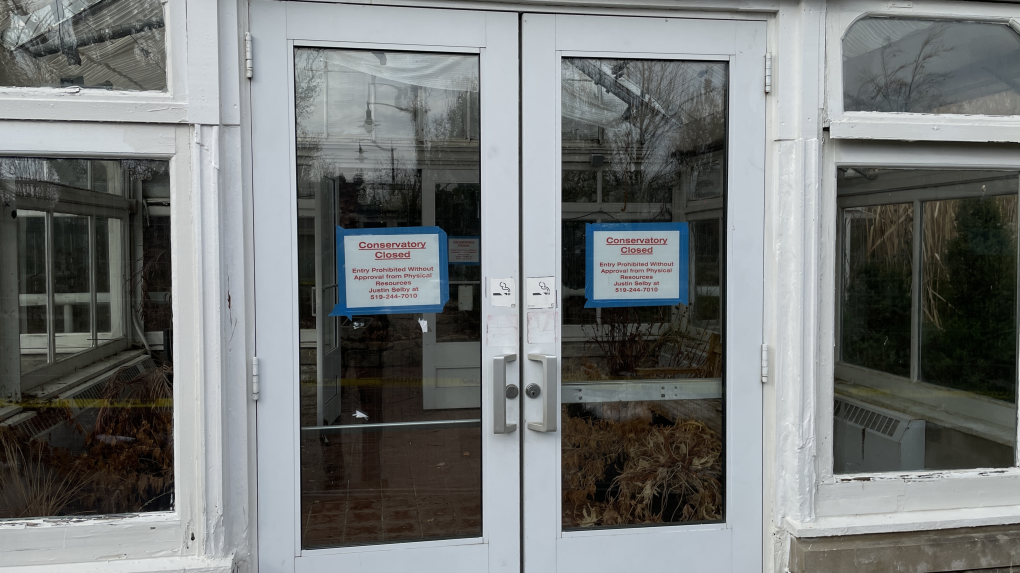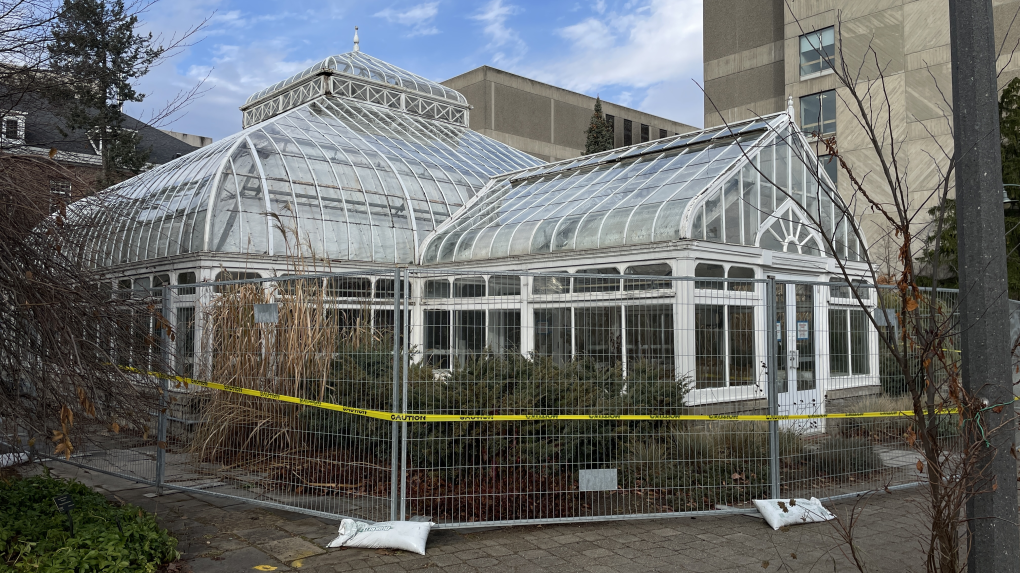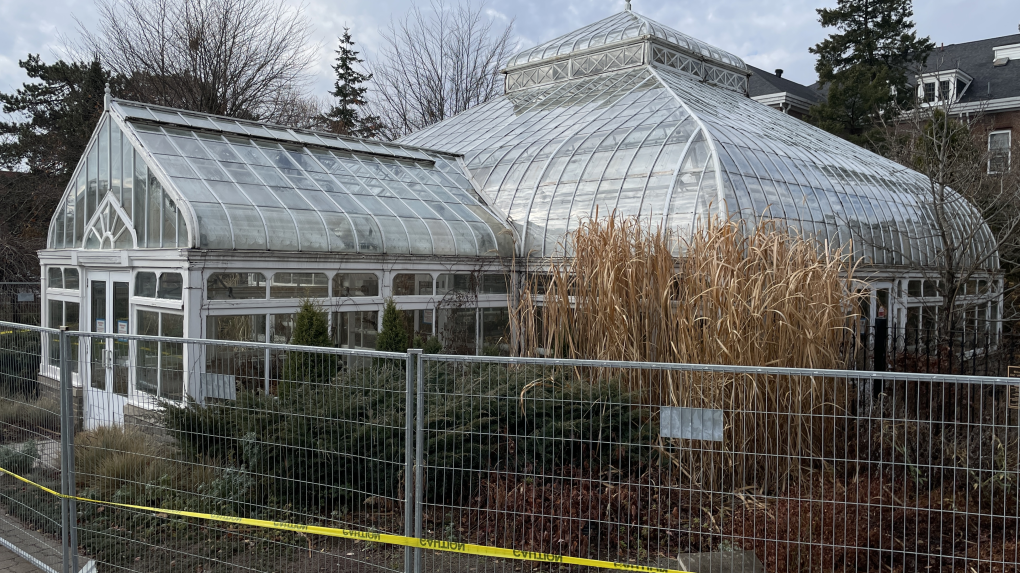Council approves University of Guelph's plan to demolish greenhouse
Guelph councillors have given the University of Guelph the go-ahead to demolish a historic greenhouse on its campus.
Tuesday night's vote, which was unanimous, followed feedback from community members who voiced their opposition to the destruction of the Rutherford Conservatory.
The building, at 37 Christine Lane, was permanently closed in Nov. 2023 due to wood rot which “considerably weakened the structure.” The university said they commissioned independent structural engineering reports which determined the structure was unsafe. Restoration was pegged at $5 million, with another $200,000 to $250,000 required each year for maintenance.
The university asked council to approve their plan to tear down the conservatory and replace it with a commemorative garden.
 Closed sign at the DM Rutherford Family Conservatory at the University of Guelph on Dec. 10, 2024. (Dave Pettitt/CTV News)
Closed sign at the DM Rutherford Family Conservatory at the University of Guelph on Dec. 10, 2024. (Dave Pettitt/CTV News)
Before giving it the green light, city councillors asked that “salvageable steel elements” be listed as “heritage attributes.”
There was also one more request.
“[They] added a motion encouraging the university to ‘retain to the best of their ability as much of the salvaged material from 37 Christie Lane and to include and incorporate both limestone and glass into the redeveloped commemorative garden,’” Krista Walkey, the city’s general manager for planning and building services, explained in an email to CTV News.
According to the school’s website, the proposed garden seeks to preserve “the spirit of the conservatory by maintaining a public space that both highlights the university’s rich contribution to horticulture” while also remaining accessible to the community.
History of the greenhouse
The pagoda-style glass structure was originally built in 1930 for the Ontario Agricultural College.
According to U of G’s website, the “header house served as the entrance into a complex of working greenhouses that supported teaching and learning in the study of floriculture.”
When the other greenhouses were torn down in the late 1980s and early 1990s, they left the conservatory as an “ornamental structure for public enjoyment.”
 The DM Rutherford Family Conservatory at the University of Guelph on Dec. 10, 2024. (Dave Pettitt/CTV News)
The DM Rutherford Family Conservatory at the University of Guelph on Dec. 10, 2024. (Dave Pettitt/CTV News)
The university said the building required significant repairs over its 94-year history. The first time was in the 1960s and then again in 1998, when most of its wood and glass were replaced.
The greenhouse was renamed after Donald M. Rutherford, a University of Guelph alum, who help facilitate most of the recent renovations.
The school said the wood rot wasn’t surprising, but rather inevitable due to the temperature fluctuations between the inside and outside of the structure.
Community reaction
Ken Yee Chew, a Guelph councillor and University of Guelph alumnus who was at Tuesday’s meeting, said the process could offer learning opportunities for incoming students.
"This would be a really big generational project for the [Ontario Agricultural College] community and for the design school as well,” he explained. “This is a first-hand learning experience that students would be able to participate in. Heritage shouldn't just be preserved for the sake of aesthetics."
 The DM Rutherford Family Conservatory at the University of Guelph on Dec. 10, 2024. (Dave Pettitt/CTV News)
The DM Rutherford Family Conservatory at the University of Guelph on Dec. 10, 2024. (Dave Pettitt/CTV News)
Some residents, however, hoped the councillors would have a change of heart.
More than 1,400 people signed a petition to save the Rutherford Conservatory before Tuesday’s meeting.
“It speaks to our heritage as the Ontario Agricultural College,” petition organizer Aimée Puthon explained. “I think it’s emblematic of our roots as a university, as a college, which is now a university [that] is globally recognized. This is really important, it’s irreplaceable and it’s a historic asset.”
She stressed its importance to the community.
“It’s really and truly the crown jewel,” Puthon said.
Heritage Guelph also opposed the school’s plan.
"Fundamentally, we do not support demolition or deconstruction," said Alexandre Krucker. "We urge council to consider providing more time for public input for the potential alternative solutions that might arise from the public."
They asked that a final decision be delayed until a design for the commemorative structure is provided.
Advocates, like Puthon, agreed with Heritage Guelph’s request.
“The proposal by the university to salvage parts of the skeleton, such as metal, does nothing to preserve the living history,” she said. “Restore it. It has seen better days. It didn't get like this overnight. We really need some stewardship and some leadership for such an architectural piece like this.”
No further details have been shared about the demolition or timeline for the project.
CTVNews.ca Top Stories

Ontario Premier Doug Ford threatens to cut off energy to U.S. in response to Trump's tariffs
Ontario Premier Doug Ford has threatened to cut off energy supply to the U.S. in response to the tariffs President-elect Donald Trump plans to impose on all Canadian imports.
Elon Musk calls Justin Trudeau 'insufferable tool' in new social media post
Billionaire Elon Musk is calling Prime Minister Justin Trudeau 'an insufferable tool' in a new social media post on Wednesday. 'Won't be in power for much longer,' Musk also wrote about the prime minister on 'X.'
Trudeau will have to 'kiss the ring' to achieve smoother bilateral relations with Trump: John Bolton
If Prime Minister Justin Trudeau wants to get on U.S. president-elect Donald Trump's good side for the sake of a smooth bilateral relationship, he'll likely have to be openly deferential, says former U.S. National Security Advisor, John Bolton.
MAID cases rose to 15,000 in 2023, but growth of cases halved
More than 15,000 people received medical assistance in dying in Canada in 2023, but federal statistics show the growth in cases has slowed significantly.
The Body Shop Canada to be sold to Serruya Private Equity
The Body Shop Canada is due to be sold to a company led by the co-founder of frozen yogurt chain Yogen Früz.
Luxury real estate brokers charged in federal indictment with sex trafficking in NYC
Two luxury real estate brokers and their brother have been charged with luring, drugging and violently raping dozens of women over more than a decade.
Police locate labyrinth of tunnels connecting tents to generator in Hamilton encampment
Hamilton police say that they discovered a series of 'man-made holes and tunnels' during a patrol of a downtown encampment earlier this week.
Certain foods may disrupt your body's fight against cancer cells, study says
The food you eat may be affecting your body’s ability to fight cancer cells in the colon, according to a new study.
Banks lower prime rates following Bank of Canada move
Canadian financial institutions are lowering their prime lending rates to match the decrease announced by the Bank of Canada.

































